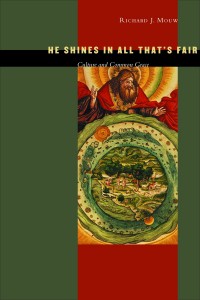As part of his Doctor of Ministry (DMin) in Ministry to Emerging Generations (Gordon-Conwell Theological Seminary), Tom’s written a number of book responses and given several short presentations (personal and group). In this series he not only “shares the wealth,” but also looks forward to your feedback as he refines his project: An argument for vocational discernment for graduate studies in the context of InterVarsity Christian Fellowship (Stay tuned to learn more!). Earlier posts on the program: Ministry to Emerging Generations and The Big Picture of Ministry to Emerging Generations.
He Shines in All That’s Fair: Culture and Common Grace

In He Shines in All That’s Fair: Culture and Common Grace (Grand Rapids, MI: Wm. B. Eerdmans Publishing Co., 2001), Richard Mouw offers a healthy form of “commonness,” “Seeking the Common Good,” and “preserv[ing] an area of mystery regarding God’s dealings with humankind” (90). In particular he addresses the challenge of common grace theology inherently leading to the “obliteration of the distinction between the Church and the world, light, and darkness, Christ and Belial, righteousness and unrighteousness” (24, quote of Herman Hoeksema). I find this of significance in conversations with students, faculty, pastors, and donors (prospective and current). Although rarely digging into Infra- versus Supra-lapsarianism (Chapter 4), I frequently address questions of vocation and/or universalism (100).
The first section I found of particular value was Mouw’s confession of “the failure of common grace thought to stem the tide of wickedness so obvious in places like the Netherlands and North America” (27), while at the same time pointing to the framework common grace offers the Christian scholar (28). What is the “key requirement”?
Discernment . . . We need the Spirit’s guidance in our hearts and minds as we seek to identify traces of the Spirit’s work in the larger creation. And we need to ground ourselves in the life and thought of that community where the Spirit is openly at work, regenerating sinners and sanctifying their inner selves. . . John Calvin told us we should expect to see: an unbelieving mind that, “though fallen and perverted from its wholeness, is nevertheless clothed and ornamented with God’s excellent gifts.’ Nor do we think that Calvin was speaking too loosely when he described these gifts as flowing from ‘a peculiar grace of God” (28-29, italics in original).
Amen! I have witnessed antinomianism in local congregations and campus ministries drawing from “common grace theology” in an unhealthy manner. Discernment is vital, especially in the context of collegiate level vocational formation.
“Chapter 3: ‘He Shines in All That’s Fair” tackles the
lines between belief and unbelief, between those whole live within the boundaries of saving grace and those who do not, while at the same time maintaining an openness to—even an active appreciation for—all that is good and beautiful and true that takes place outside of those boundaries (32-33).
In InterVarsity’s Emerging Scholars Network and at InterVarsity’s Urbana Student Missions Conference, I regularly return to “lines between belief and unbelief” and the question of whether God thinks about things beyond “the ultimate destiny of human beings” (33), to which the answer is, “Yes!” The “ladder” of Christian vocational choices presses upon many students. In the end, Mouw “insist[s] that as God unfolds his plan for his creation, he is interested in more than one thing. Alongside of God’s clear concern about the eternal destiny of individuals are his designs for the larger creation” (50). As in When the Kings Come Marching in: Isaiah and the New Jerusalem (Grand Rapids, MI: Wm. B. Eerdmans Publishing Co., 1983), Mouw offers the vision of Revelation 21:24-26.
To God be the glory!
Tom enjoys daily conversations regarding living out the Biblical Story with his wife Theresa and their four girls, around the block, at Elizabethtown Brethren in Christ Church (where he teaches adult electives and co-leads a small group), among healthcare professionals as the Northeast Regional Director for the Christian Medical & Dental Associations (CMDA), and in higher ed as a volunteer with the Emerging Scholars Network (ESN). For a number of years, the Christian Medical Society / CMDA at Penn State College of Medicine was the hub of his ministry with CMDA. Note: Tom served with InterVarsity Christian Fellowship / USA for 20+ years, including 6+ years as the Associate Director of ESN. He has written for the ESN blog from its launch in August 2008. He has studied Biology (B.S.), Higher Education (M.A.), Spiritual Direction (Certificate), Spiritual Formation (M.A.R.), Ministry to Emerging Generations (D.Min.). To God be the glory!

Leave a Reply